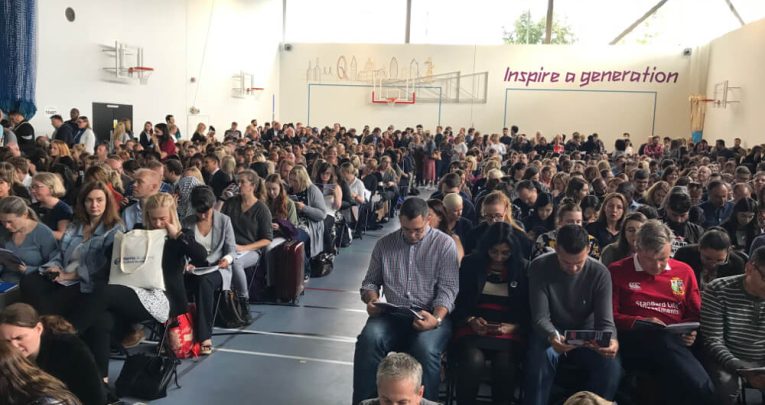8 Things we Learnt at ResearchED 19

Teachers love a freebie, your students have you pegged in seconds, and other things we found out at this weekend's big education event…

- by Helen Mulley
- Former editor of Teach Secondary magazine and award-winning podcast host

For most teachers in the UK, September 7th was the first Saturday of the new academic year.
So why, after what had almost certainly been an intense week of setting expectations, learning names, establishing classroom norms and, well, teaching (not to mention all the planning that went into being able to do that from day one), did over 1,500 of them choose to spend it at a CPD event?
Because that event was the ResearchED national conference, that’s why – a turbo-charged package of phenomenally powerful learning opportunities, with every talk, presentation and workshop backed up by genuinely solid, thoroughly interrogated evidence.
As always, the hardest part was choosing which sessions to attend – but despite reluctantly ruling out such luminaries as Daisy Christodolou, Tom Sherrington and Oliver Quinlan, I was well rewarded for the pathway I chose through the day; and here are just a few of my key takeaways…
1 | ‘Geeking out’ is the best planning of all
According to Chris Fountain, of English Mastery, teachers are still spending far too much time coming up with resources, rather than thinking about how they could best teach lessons.
Collaboration, he says, is the answer – because improving your subject knowledge is the route to becoming a better teacher, and there can be few better uses of your time than ‘geeking out as a team’ with the rest of your department.
2 | Some people really don’t like Direct Instruction
Despite compelling evidence for its positive impact on outcomes – and not just from Project Follow Through – Engelmann’s approach to teaching our most vulnerable kids is still strangely controversial.
In this fast-paced session, Naveen Rizvi offered delegates an overview of ‘the journey of DI’, based on Engelmann’s ‘Teaching Needy Kids in our Backward System’ – which I suspect everyone in the room now currently has on order. It’s a fascinating story, and well worth exploring, whatever you think you think about DI.
3 | Relationships and mindset are as important as memory
Of course we need to teach our students sound strategies for remembering and recalling what they learn, insisted Tricia Taylor of TailoredPractice – but there are other things that must be in place for this to happen effectively, too.
For example, how often do you ask yourself what it is really like to be a student in your own classroom? Although somewhat frustrated by having to scroll around a PDF of slides, due to a case of The Wrong USB Stick, Tricia delivered a lively and informative presentation, with plenty of practical tips to take away, including, above all ‘make sure every child is known’.
4 | You can’t just wish people to be better…
If you really want a school to be research-driven, with every teacher striving for improvement using evidence-based approaches – then as a leader, you have to make that happen, insisted John Tomsett, head of Huntington School.
Essentially, if you aren’t prepared to work on improving your practice, all the time, then don’t bother applying for a position at Huntington… but if you are, and your application is successful, then you can expect every support from your SLT to ensure you do exactly that, including ring-fenced training time and the assumption that you will get your pay increase unless you do something dramatically terrible enough to lose it.
5 | You need a lot of knowledge to really understand why it rains
Geography teacher Ben Ranson has been rethinking how we can ensure that students genuinely understand what we want them to understand – and his version of knowledge organisers, with an added dual coding twist, could certainly make a difference when it comes to explaining scientific concepts.
It’s slightly harder to see how they might work for, say, the English department, he conceded… but of course, this was ResearchED, and so by the end of the session a conversation had already started on that very topic amongst English specialists. Watch this space!
6 | Your students have you pegged after the first two seconds
Yup, that’s right. Research suggests that two seconds of non-verbal communication is all it takes for learners to form a judgement about how effective a teacher is – and, rather more frighteningly, that judgement is extremely likely to be correct.
There were more laughs in Sam Pullan’s session (snappily titled, “You had me at hello – which is just as well as I made up my mind about you in two seconds”) than in any of the others I attended; but that didn’t mean the evidence in front of us was any less thoroughly tested.
So, what can you do to make sure those two seconds really count? Be ‘enthusiastic and likeable’ above all, apparently – and, erm, ‘keep your arms symmetrical’. No, we didn’t get that, either…
7 | Schools influence children’s character, whether you like it or not…
… so why not make that an explicit aspect of your ethos, asked Adam Seldon (yes, he is a relation)?
There has been some snippiness in recent years around ‘character education’, but Seldon offered a passionate and logical defence of it, using the state secondary where he works as an example of how a carefully considered character education programme can enhance both the student experience, and ultimate outcomes.
Whilst I wasn’t entirely convinced by the idea of Gratitude Week, which sounded a bit too Orwellian for my taste, he put a strong case, with charming conviction, which made for a positive and uplifting end to the day.
And finally…
8 | Teachers just can’t resist a freebie
That probably comes as a surprise to no-one – but it was great to see the TeacherTapp stand thronged all day with educators waving their phones at Laura, Becky and the rest of the team to prove they’d downloaded the app, and being rewarded with a go on the tombola, walking away with mugs, pens, torches… and in a couple of super-lucky cases, a HUE HD visualiser. Have you started Tapping yet?










